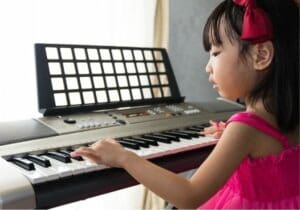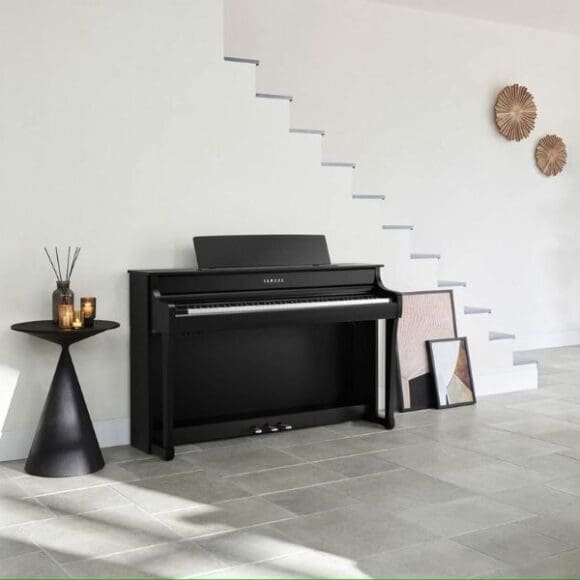A keyboard. More compact and understated than a piano but does it work in much the same way? Is it possible to learn to play the piano properly using a keyboard?
These are questions that get asked frequently. And for many different reasons. Some people are tempted by the convenience of a keyboard, others are wary of the expense of a piano. For many, it’s just simply a case of weighing up all the options and wondering what’s possible.
So to help, here the team at Richard Lawson Pianos take a closer look at what a keyboard offers and the alternative options out there.
What’s the difference between a keyboard and a piano?
· Action
The ‘action’ is how keys respond when pressed. Piano keys are weighted and feel heavier when you push down in comparison to the lighter feel of keyboard keys. This can influence the player’s expression and control of a piece when initially transferring between instruments.
· Sound
We’d struggle to think of a more beautiful sound than that of well-tuned piano – but it only has one voice.
Whilst not 100% authentic, a keyboard is electric and can offer an impressive imitation of the piano. It can also produce alternative sounds – string instruments, horns, organs…a dog bark!?
· Keys
Regardless of whether you’re playing on a grand or an upright, piano keys come in the same standard width.
To all intents and purposes the look and feel of keyboard keys mimic those of a piano. The arrangement is identical and often the size too, but it’s not unusual for them to be narrower than a standard piano key either.
· Range
Another consideration with keys is how many there are. A standard piano has 88 keys and plenty of keyboards come with 88 keys too – but it does depend on the model you go for.
If you’re going to minimise the impact of learning to play the piano on a keyboard, you’ll need to opt for a model with at least 72 keys.
· Expense
As with most purchases, there are a wide range of keyboard makes and models to choose from. The price you pay will depend on the one you choose and the features it offers, but regardless, you can expect to pay substantially more for a piano.
· Size
Even the largest keyboard on the market is unlikely to rival the overall size of a piano. Designed to be lightweight and compact, a keyboard is easily moved and transported about, unlike a piano which you would usually expect to stay in one position.
·Tuning
A piano must be regularly tuned to maintain its pitch-perfect sound. A keyboard requires no tuning but will need a source of power or regular battery changes in order to play.
So is the keyboard a viable option?
People worry about switching from a keyboard to a piano. Fretting it will affect playing ability and that the feel and sound produced won’t be the same.
To some degree this is true, but it’s clear to see there are also many similarities. The scales, concepts and practice methods learnt will all transfer relatively easily between both instruments. But this might also involve a fairly steep learning curve, at first.
At Richard Lawson Pianos, we would never discourage anyone from learning to play the piano: grab whatever you can and start making music! So the answer is, yes, you can learn to play the piano on a keyboard, but it’s not your only option…
Alternatives to a keyboard
If you can learn to play the piano on a piano, that’s the ideal. But there are numerous barriers that can make that difficult – expense, space, practicalities. However, don’t dismiss the idea before taking a look at the range of alternative options out there:
· Digital pianos
If a keyboard is more within budget, you’re short on space, or you’re after more flexibility, digital pianos are a popular alternative.
With high-end features including impressively realistic, controllable sound. The option to wear headphones. And a full set of 88 keys with weighted action – this is as close as you’ll get to the real deal without actually buying an acoustic piano.
You can even harness the digital benefits by connecting to apps to support your learning.
· Shop smaller
Is storage the issue? Pianos are designed to make a statement and they can be a great feature in any home but there’s no denying the fact that they take up space.
The good news is there’s no one set size – upright pianos are far more compact than a grand piano, and there’s plenty of variation between different models.
· Buy a pre-owned piano
If all you’ve ever wanted is to play the piano, it’s unlikely a keyboard will cut it long term. So if it’s the cost that’s holding you back, why not consider a second-hand piano?
With the right care, a piano can last a lifetime and a pre-owned model will not only cost you significantly less, it will also retain more of its value. Buy a pre-owned piano from a reputable dealer such as ourselves, and you’ll be hard pushed to know it wasn’t brand new.
· The ‘Take it away’ scheme
Another option if you’re drawn to a keyboard based on expense, is to look for a piano dealer involved in the ‘Take it away’ scheme. A fantastic initiative launched to offer interest-free loans for musical instruments, equipment and tuition. With the possibility of loaning of up to £5,000, it could be a game (and instrument!) changer.
Talk to the piano experts
To find out more about finance options, advice on the best small acoustic piano models, or for guidance on buying second hand, talk to the experienced team at Richard Lawson Pianos.
Make contact today by calling 01923 720 974, email info@richardlawsonpianos.com or fill in our contact form and we’ll be back in touch soon.
















 Reviews
Reviews